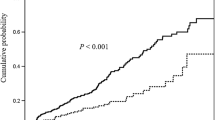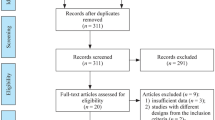Abstract
Introduction
Many patients with inflammatory bowel disease (IBD) are vitamin D deficient. The purpose of our study was to identify risk factors for vitamin D deficiency in IBD and to assess the impact of vitamin D repletion on disease activity and quality of life (QOL).
Methods
Patients with at least one 25-OH vitamin D level measured between 2004 and 2011 were included. Patients with a level <30 ng/ml at baseline were followed until the time of repletion. QOL and disease activity scores were measured at baseline and repletion.
Results
A total of 255 patients were identified. 33, 29, and 39% had a vitamin D level of ≥30, 20–29, and <20 ng/ml, respectively. When adjusting for disease type and duration, gender, smoking, and race, non-Caucasians had 5.3 (2.3–12.3) and UC patients had a 0.59 (0.33–1.03) odds of having a vitamin D <30 ng/ml. Women were 1.7 times more likely to have a 25-OH vitamin D level <20 ng/ml than men. 55 patients underwent repletion. In CD patients, the HBI and SIBDQ prior to repletion was 5.5 ± 4.9 and 44.3 ± 16.4, respectively; these improved to 3.6 ± 3.4 and 48.6 ± 14.2 after repletion (p = 0.0154 and p = 0.0684).
Conclusions
In this tertiary care IBD cohort, the majority of patients have low vitamin D levels. Non-Caucasian race and female gender are associated with low vitamin D. UC was associated with lower risk of vitamin D insufficiency. In CD, vitamin D repletion is associated with decreased disease activity and increased QOL.

Similar content being viewed by others
References
Narula N, Marshall JK. Management of inflammatory bowel disease with vitamin D: beyond bone health. J Crohns Colitis. 2012;6:397–404.
Ulitsky A, Ananthakrishnan AN, Naik A, et al. Vitamin D deficiency in patients with inflammatory bowel disease: association with disease activity and quality of life. JPEN J Parenter Enter Nutr. 2011;35:308–316.
Mouli VP, Ananthakrishnan AN. Review article: vitamin D and inflammatory bowel diseases. Aliment Pharmacol Ther. 2014;39:125–136.
Forrest KY, Stuhldreher WL. Prevalence and correlates of vitamin D deficiency in US adults. Nutr Res. 2011;31:48–54.
Looker AC, Johnson CL, Lacher DA, et al. Vitamin D status: Untied States 2001–2006. NCHS data brief, no 59. Hyattsville, MD: National Center for Health Statistics; 2011.
Castro FD, Magalhaes J, Carvalho PB, et al. Lower levels of vitamin D correlate with clinical disease activity and quality of life in inflammatory bowel disease. Argent Gastroenterol. 2015;52:260–265.
Kabbani TA, Koutroubakis IE, Schoen RE, et al. Association of vitamin D level with clinical status in Inflammatory Bowel Disease: a 5-year Longitudinal Study. Am J Gastroenterol. 2016;111:712–719.
Joseph AJ, George B, Pulimood AB, et al. 25 (OH) vitamin D level in Crohn’s disease: association with sun exposure and disease activity. Indian J Med Res. 2009;130:133–137.
Lennard-Jones JE. Classification of inflammatory bowel disease. Scand J Gastroenterol Suppl. 1989;170:2–6 (discussion 16–19).
Silverberg MS, Satsangi J, Ahmad T, et al. Toward an integrated molecular and serological classification of inflammatory bowel disease: report of a working party of the 2005 Montreal World Congress of gastroenterology. Can J Gastroenterol. 2005;19:5–36.
Harvey RF, Bradshaw JM. A simple index of Crohn’s-disease activity. Lancet. 1980;1:514.
Walmsley RS, Ayres RC, Pounder RE, et al. A simple clinical colitis activity index. Gut. 1998;43:29–32.
Irvine EJ, Zhou Q, Thompson AK. The Short Inflammatory Bowel Disease Questionnaire: a quality of life instrument for community physicians managing inflammatory bowel disease. CCRPT Investigators. Canadian Crohn’s Relapse Prevention Trial. Am J Gastroenterol. 1996;91:1571–1578.
Garg M, Rosella O, Lubel JS, et al. Association of circulating vitamin D concentrations with intestinal but not systemic inflammation in inflammatory bowel disease. Inflamm Bowel Dis. 2013;19:2634–2643.
Blanck S, Aberra F. Vitamin d deficiency is associated with ulcerative colitis disease activity. Dig Dis Sci. 2013;58:1698–1702.
Ananthakrishnan AN, Cagan A, Gainer VS, et al. Normalization of plasma 25-hydroxy vitamin D is associated with reduced risk of surgery in Crohn’s disease. Inflamm Bowel Dis. 2013;19:1921–1927.
Miheller P, Muzes G, Hritz I, et al. Comparison of the effects of 1,25 dihydroxyvitamin D and 25 hydroxyvitamin D on bone pathology and disease activity in Crohn’s disease patients. Inflamm Bowel Dis. 2009;15:1656–1662.
Boothe D. High dose vitamin D improved clinical activity in crohn’s disase. Washington, DC: American College of Gastroenterology; 2011.
Jorgensen SP, Agnholt J, Glerup H, et al. Clinical trial: vitamin D3 treatment in Crohn’s disease—a randomized double-blind placebo-controlled study. Aliment Pharmacol Ther. 2010;32:377–383.
Raftery T, Martineau AR, Greiller CL, et al. Effects of vitamin D supplementation on intestinal permeability, cathelicidin, and disease markers in Crohn’s Disease: results from a randomised double-blind placebo-controlled study. United European Gastroenterol J. 2015;3:294–302.
White JH. Vitamin D deficiency and the pathogenesis of Crohn’s disease. J Steroid Biochem Mol Bio. 2016. doi:10.1016/j.jsbmb.2016.12.015.
Author information
Authors and Affiliations
Corresponding author
Ethics declarations
Conflict of interest
None.
Rights and permissions
About this article
Cite this article
Zullow, S., Jambaulikar, G., Rustgi, A. et al. Risk Factors for Vitamin D Deficiency and Impact of Repletion in a Tertiary Care Inflammatory Bowel Disease Population. Dig Dis Sci 62, 2072–2078 (2017). https://doi.org/10.1007/s10620-017-4614-y
Received:
Accepted:
Published:
Issue Date:
DOI: https://doi.org/10.1007/s10620-017-4614-y




